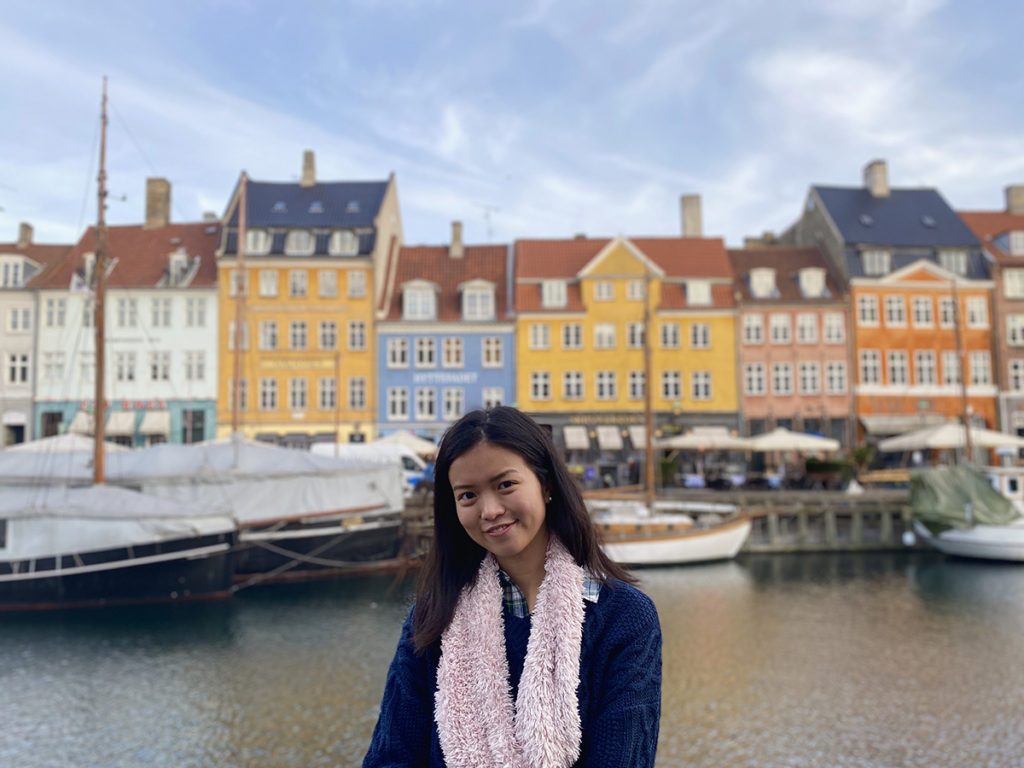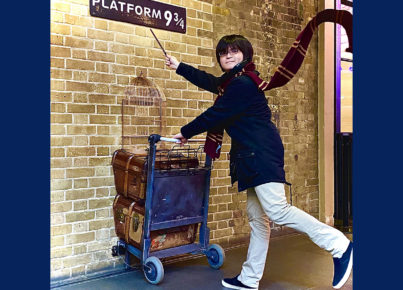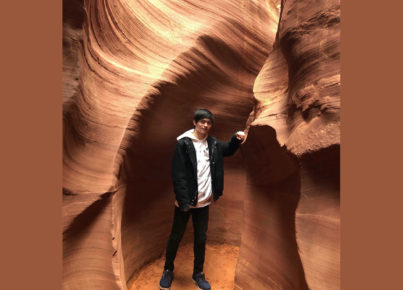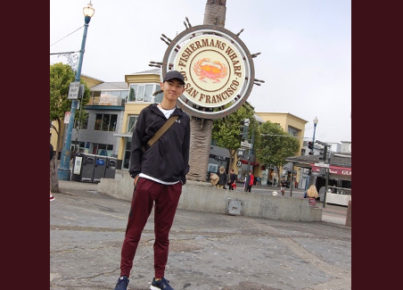“Life after COVID-19: creating and enjoying new norms”
Koh Xiang Ting
Occupational Therapist
in Singapore
Looking back at the year 2020, it definitely was a time that was different from how we knew life to be. Our daily routines, relationships, work, leisure and many aspects of our lives have changed. Over the past few months, we have come to accept new norms and habits even as we attempt to seek some form of familiarity and normality as the current climate improves. The onset of COVID-19 in Singapore was sudden and the number of cases rose rapidly. Along with it came laws and policies put in place to protect the general public health and Singaporeans. One major change to our lives was when “circuit breaker” was implemented, where Singaporeans were not permitted to leave their homes except to buy groceries and dining out was prohibited. This saw panic buying of essential supplies like food, masks and hand sanitizers. Businesses suffered as well as dining out was not allowed and people could not visit malls. Office workers were made to work from home, students had home based learning and only essential workers like healthcare staff were allowed to leave home for work. Air travel, mass gatherings (i.e. religious meetings, weddings, graduations) were halted as well. To many people, it felt as if life just came to a screeching halt all at once.
Despite all these restrictions, Singaporeans adapted and learned how to cope with these changes. Change was difficult especially in the initial phases where people felt like they lost their opportunity to connect with others and their sense of routine. However, they turned to technology and many things became digitalized. People started to use online platforms to do work and home-based learning. Friends started to meet each other online, play games and exercise together. Businesses started to go online (i.e. food, fitness etc.), offering services and products to customers in a more affordable and accessible manner. Graduations, weddings, religious meetings were held on online platforms so that communities and groups of people could still function while protecting public health. Museums and various countries offered virtual tours as the tourism sector suffered from the lack of air travel. Even though this was a difficult time for many people, there was a silver lining in the dark clouds that were ahead of us.
As author Steve Maraboli once said, “once your mindset changes, everything on the outside will change along with it”. There are many ways to look at how life has changed and our perspective influences how we adapt to that change. Some decided to embrace the change by maximizing available resources (i.e. technology) or looking for alternatives such as doing activities that were available at home. Personally, I was initially worried about how I would maintain my personal relationships and occupy my time at home as I had just recently graduated from university. There were things that I could not attend such as my graduation ceremony and going on a graduation trip with my friends. Although these might seem minute in the bigger scheme of things that serve to protect public health, they were important milestones to me. Just like many others who were afraid that life will not resume and that they will miss out what they have been looking forward to, I was disappointed. However, I thought about how I would embrace this situation if I could not change it. So I started to reach out to people over online platforms and I started an exercise group with my friends. I also started to pick up new skills that I never had the chance or energy to do so. I started to bake, cook and learn how to sew to make full use of my time. I took the time to develop myself and explore new interests that I otherwise would have given myself excuses not to. I realized that with more time on my hands, I could slow down my pace of life and make informed choices without having to keep up with the regular demands of life.
Although a rather positive picture of the COVID-19 situation was painted above, we also need to recognize that there are groups of people who were unable to overcome the challenges it posed. These are people who do not have access to resources like technology or vulnerable populations who were unable to fend for themselves due to certain circumstances. During this period, I became more aware of such people and the good causes that support them. One of these causes was the migrant worker coalition that looked at providing support for migrant workers in Singapore. These workers come from various countries and have helped to build Singapore up to the concrete jungle we know today. There was a spike in cases in the migrant worker population due to their living conditions where there is a high density of workers living in enclosed areas. Some causes sought to provide them with basic necessities while other causes aimed at translating information and educational material for them to understand the current situation. For myself, I donated to support these causes and almost attempted to provide counseling services for migrant workers. Without COVID-19, these causes and issues would not have been so apparent for me as I would have just gone through my daily routine and life. The disruptions to daily life made me more attuned to the challenges that others face as I became more curious about how others were coping. Creating and enjoying new norms was something I managed to come to terms with after the onset of COVID-19. This is because life we know might not resume as it is as there are things that have changed for the better and there are things that we might not be able to salvage. However, this pandemic forced us to adapt and come out stronger as a nation. At the same time, it encouraged me to open my eyes to look beyond myself and consider the wide world around me.
2020年を振り返ってみると、間違いなく、私たちが知っていたこれまでの生活のあり方とは異なる時代となりました。私たちの日常生活、人間関係、仕事、レジャー、そして生活の多くの側面が変化しました。ここ数ヶ月の間に、私たちは新しい規範や習慣を受け入れるようになりました。日々の状況が好転していく中、私たちは親和性や規範性を求めようとしています。シンガポールでのCOVID-19の発症は突然のことで、症例数は急速に増加しました。それに伴い、一般市民の健康とシンガポール人を守るための法律や政策が打ち出されました。私たちの生活を大きく変えたのは、「サーキットブレーカー」の導入でした。シンガポール人は食料品を買う以外は家から出ることができず、外食も禁止されました。これにより、食料品やマスク、手指消毒剤などの必需品を慌てて購入することになり、パニックに陥りました。外食も禁止され、ショッピングモールに行くこともできなかったので、経済にも大きな影響をきたしました。オフィスワーカーは自宅で仕事をするようになり、学生は自宅で学習し、医療スタッフのような必要不可欠な労働者だけが仕事のために自宅を離れることが許されました。空の旅、集団の集会(宗教的な集会、結婚式、卒業式など)も禁止されていました。多くの人にとっては、生活が一気に停止したかのように感じられました。
しかし、シンガポールの人々は、このような制約にもかかわらず、変化に適応し、対処する方法を学びました。特に最初の段階では、人とのつながりや日常の感覚が失われたように感じていたので、変化に適応するのは大変でした。しかし、人々はテクノロジーに目を向け、多くのことがデジタル化されていきました。人々は仕事や家庭学習のためにオンラインプラットフォームを使い始めました。オンラインで友人に会い、ゲームをしたり、一緒に運動したりするようになりました。ビジネスもオンライン化が進み(食品、フィットネスなど)、より手頃な価格でアクセスしやすい方法で顧客にサービスや製品を提供するようになりました。卒業式、結婚式、宗教的な会合がオンラインプラットフォーム上で開催されるようになり、コミュニティや人々のグループが公衆衛生を守りながらも活動できるようになりました。観光業が航空産業の不振にあえいでいたので、博物館や様々な国がバーチャルツアーを提供しました。多くの人々にとって困難な時であったにもかかわらず、目の前に広がる暗雲の中には明るい兆しが見えたのです。
作家のスティーブ・マラボリはかつて言いました。「一度考え方が変われば、外面のすべてがそれに伴って変わる」 と。人生がどう変化したかを見るために多くの方法があります。私たちの価値観は、変化にどう適応するか、ということに影響を与えます。利用可能なリソース(テクノロジーなど)を最大限に活用する人や、家でできる活動をするなどの代替手段を探す人もいました。このように、人々は変化を受け入れることにしたのです。個人的には、大学を卒業したばかりだったので、人間関係をどうやって維持し、家での時間をどうやって過ごすかを最初は心配していました。卒業式への出席や友達との卒業旅行など、できなくなったこともありました。このようなことは、公衆衛生を守るための大きな計画の中では些細なことのように思えるかもしれませんが、私にとっては重要な節目でした。他の多くの人たちと同じように、これまでのような生活が再開されず、楽しみにしていたものを失うのではないかと恐れていた私は、がっかりしました。しかし、私はこの状況を変えることができない場合、どのようにしてこの状況を受け入れるかを考えました。そこで、ネット上のプラットフォームで人に声をかけたり、友達と一緒にオンライン運動グループを始めたりしました。また、これまで機会もエネルギーもなかった新しいスキルを身につけ始めました。時間を有効に使うために、パン作り、料理、裁縫を始めました。自分を成長させるために時間を使い、そうでなければ自分に言い訳をして決してやらなかったであろう新しい興味を探求しました。自分の時間が増えれば、生活のペースをゆっくりとさせ、生活に追われることなく、情報に基づいた選択をすることができることに気がつきました。
このエッセイの中で、COVID-19の状況をかなりポジティブに描いてきましたが、COVID-19がもたらす課題を克服できなかった人たちがいることも認識しておく必要があります。テクノロジーのような資源にアクセスできない人々や、ある状況のために自活ができない脆弱な人々もいるのです。コロナ禍で、私はそのような人々に目を向け、彼らを支援するための良い方法について考えるようになりました。その一つが、シンガポールの移民労働者の支援を目的とした「移民労働者連合」でした。移民労働者は様々な国から来ていて、シンガポールを今の高層ビル群が立ち並ぶような状態に作り上げてくれました。移民労働者は密な環境で暮らしているので、彼らが感染するケースが急増していました。彼らに生活必需品を提供しようとする活動もあれば、情報や教材を翻訳して現状を理解してもらおうとする活動もありました。私自身は、これらの活動を支援するために寄付をし、移民労働者のカウンセリングサービスを提供しようとも試みました。COVID-19がなければ、このような問題やその原因となることについて、ただ単に毎日の生活を送っていた私が、意識を向けることもなかったと思います。日常生活に大きな変化が起こったことにより、他の人が困難にどう対処しているのかに興味を持ち、直面している課題に関心を寄せるようになりました。
新しい規範を創造し享受することは、COVID-19が発生した後に、自分自身でなんとか折り合いをつけることができたことです。なぜなら、私たちのコロナ禍前の生活は、COVID-19発生後、良い方に変わったこともあれば、二度と元には戻せないこともあり、以前の状態のまま生活を再開できないかもしれないからです。しかし、このパンデミックは、私たちに適応することを迫り、国として強くなることを余儀なくさせました。それと同時に、パンデミックは、私自身の視野を広げ、広い世界に目を向けるように仕向けてくれました。








